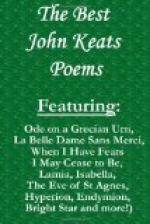|
This section contains 9,353 words (approx. 32 pages at 300 words per page) |

|
SOURCE: Sherwin, Paul. “Dying into Life: Keats's Struggle with Milton in Hyperion.” PMLA: Publications of the Modern Language Association of America 93, no. 3 (May 1978): 383-95.
In the following essay, Sherwin considers Keats's poetic reactions to Milton. He concentrates on Hyperion, noting both Milton's influence on its style, formal design, and mythological structure and Keats's attempt to create a poem of progress that subverts Milton's moral view.
One of the most famous Romantic characterizations of Milton is Wordsworth's in the sonnet “London, 1802”:
Thy soul was like a Star, and dwelt apart: Thou hadst a voice whose sound was like the sea: Pure as the naked heavens, majestic, free.
The lines illumine Keats's “Bright Star” sonnet, which distinguishes two kinds of steadfastness and, by implication, two contrary poetic standpoints. The star of the octave, “in lone splendour hung aloft the night,” is an emblem of the Miltonic visionary, the sublimely self-sufficient...
|
This section contains 9,353 words (approx. 32 pages at 300 words per page) |

|


